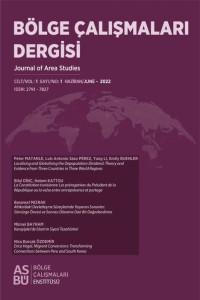THE EFFECTS OF ECONOMIC GLOBALIZATION ON DEVELOPING STATES: THE CASE OF THE REPUBLIC OF BENIN (2016–2021)
THE EFFECTS OF ECONOMIC GLOBALIZATION ON DEVELOPING STATES: THE CASE OF THE REPUBLIC OF BENIN (2016–2021)
The effects of economic globalization on developing states have always been a topic of concern since the beginning of the 20th century. Scholars and policymakers were drawn to the debate over the consequences of economic globalization on developing countries by two key considerations: The emergence of International Political Economy as an autonomous and distinct discipline in International Relations and the transformation of the "global economy". This study intends to investigate the consequences of economic globalization on third-world countries, particularly after World War II international economic order. The Republic of Benin will be used as a case study to empirically test the impact of neoliberal economic policies on developing countries. No scholarly article has tried to analyze the effects of economic globalization on Benin alone. Research on the topic have analyzed sub-Saharan African countries collectively, which is why this analytical research was carried out to examine the issue in Benin context, particularly after March 2016 nationwide privatization. A mixed research methodology has been used to access and collect secondary data from government intuitions, international organizations, and academic journals. Initially, three different ongoing debates on economic globalization have been examined using qualitative data. Then, statistical evidence was used to test the applicability of the assumptions in the case of Republic of Benin. The study has been concluded that the argument of the hyperglobalist best reflects how the Republic of Benin is affected by the economic globalization.
Keywords:
The Republic of Benin, Economic Globalization, Privatization, Economic Multilateralism Trade Liberalization,
___
- Adjovi-Ahoyo, N., Glin, L. C., and Azandegbe, D. (2013). Analyse des interventions du pouvoir public dans le secteur agricole au Bénin de 1960 à nos jours. In Etude. Cotonou, Bénin: Conseil D’analyse Économique.
- Ashley, R. K. (1984). The Poverty of Neorealism. International Organization, 38(2), 225–286.
- Bennell, P. (1997). Privatization in Sub-Saharan Africa: Progress and prospects during the 1990s. World Development, 25(11), 1785–1803.
- Bożyk, P. (2019). Globalization and the Transformation of Foreign Economic Policy (1st ed.). Routledge.
- Ciochetto, L. (2023). China versus the US, World Bank and IMF in Sub-Saharan Africa, Vol. 02, World Scientific (Europe). New Zealand: Massey University.
- Dedjinou, S. V. F. (2022). la demande d’énergıe électrıque des ménages au Benin. Les Cahiers Du Cread, 38(1), 61–104.
- Dosi, G. (2003). Twenty years after Nelson and Winter’s An Evolutionary Theory of Economic Change: A preface on knowledge, the nature of organizations and the patterns of organizational changes. Industrial and Corporate Change, 12(2), 147–148.
- Ecofin, A. (n.d.). Bénin: Nouvelle augmentation du tarif électrique par la SBEE. Agence Ecofin. https://www.agenceecofin.com/distribution/2001-84289-benin-nouvelle-augmentation-du-tarif-electrique-par-la-sbee (Accessed Date: 03.03.2023).
- Economie-Benin: La difficile privatisation de la société cotonnière surfond de mauvaise gestion -Analyse. (2004, September 30). IPS Français. http://ipsnews.net/francais/2004/09/30/economie-benin-la-difficile-privatisation-de-la-societe-cotonniere-surfond-de-mauvaise-gestion-analyse/
- Gavin, F. J. (2004). Gold, Dollars, and Power: The Politics of International Monetary Relations, 1958-1971. UNC Press Books.
- GDP growth (annual %)-Benin Data. (n.d.). World Bank. https://data.worldbank.org/indicator/NY.GDP.MKTP.KD.ZG?end=2019&locations=BJ (Accessed Date: 02.03.2023).
- Gürel, A. (Ed.). (2016). Second Language Acquisition of Turkish (Vol. 59). John Benjamins Publishing Company. 81
- The Effects of Economic Globalization on Developing States: The Case of the Republic of Benin (2016–2021)
- Hannah, E., Scott, J., and Wilkinson, R. (2018). The WTO in Buenos Aires: The outcome and its significance for the future of the multilateral trading system. The World Economy, 41(10), 2578–2598.
- Houngbedji, A. (1994). Le renouveau démocratique du Bénin: Genèse, enjeux et perspectives. Revue Juridique et Politique: Indépendance et Coopération, 48(1), 17–26. INStaD. (2020, March 23). Statistiques Sociales, from https://instad.bj/statistiques/statistiques-sociales.
- Lipscy, P. Y. (2015). Explaining Institutional Change: Policy Areas, Outside Options, and the Bretton Woods Institutions: Explaining Institutional Change. American Journal of Political Science, 59(2), 341–356.
- Margerum Harlen, C. (1999). A Reappraisal of Classical Economic Nationalism and Economic Liberalism. International Studies Quarterly, 43(4), 733–744.
- Ministère des Petites et Moyennes Entreprises et de la Promotion de l’Emploi. (2018). Politique Nationale de l’Emploi 2020—2025. Ministère des Petites et Moyennes Entreprises et de la Promotion de l’Emploi.
- Mishkin, F. S. (2010). The Financial Crisis and the Federal Reserve. NBER Macroeconomics Annual, 24(1), 495–508.
- Moustaphaly, M. (2020). Une Politique Monétaire pour l’Emploi dans l’UEMOA. Revue Internationale Des Économistes de Langue Française, 5(2), 126–147.
- Polat, A., Shahbaz, M., Rehman, I. U., and Satti, S. L. (2015). Revisiting linkages between financial development, trade openness and economic growth in South Africa: Fresh evidence from combined cointegration test. Quality & Quantity, 49(2), 785–803.
- Sims, J. and Romero J. (2013, November 22). Latin American Debt Crisis of the 1980s | Federal Reserve History. Latin American Debt Crisis of the 1980s. https://www.federalreservehistory.org/essays/latin-american-debt-crisis.
- Wendt, A. (1995). Constructing International Politics. International Security, 20(1), 71–81.
- Başlangıç: 2022
- Yayıncı: Ankara Sosyal Bilimler Üniversitesi
Sayıdaki Diğer Makaleler
AUKUS CAN ENDANGER ASEAN CENTRALITY
